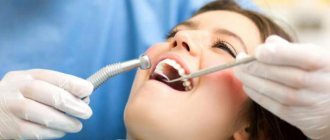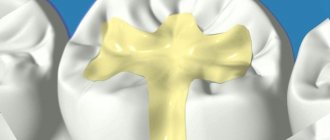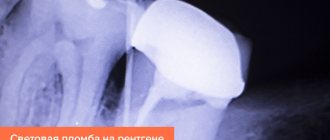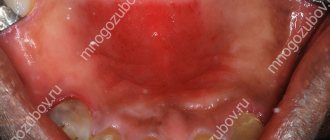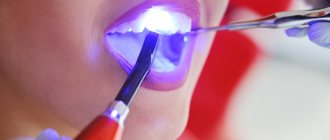- Why a temporary filling is placed: types of material
- Why does a tooth with a temporary filling hurt: the main reasons
- Standard activities after installation of the material
- Temporary filling hurts when pressed: how to cope with the disease
Many patients complain to dentists that their tooth hurts under a temporary filling. For the first 2-3 days, a slight aching pain is considered normal and does not cause cause for concern or panic. It is associated with the active influence of drugs on the nerve endings of the molar or premolar.
If the temporary filling hurts very strongly and for a long time when pressed, it is recommended to make an appointment with a specialist earlier than the specified date. Dentists at the reliable A-Medic clinic will conduct a thorough examination and prescribe a diagnostic examination to find out what exactly is causing the pain. All people are scared that they have had a temporary filling installed and their tooth hurts, but most often there is no reason to worry.
Content:
- When is a non-permanent filling indicated?
- Why does a tooth with a temporary filling hurt?
- When to sound the alarm
- What to do if a tooth hurts under a temporary filling
- Preventive measures
Most often, people rush to the dental clinic because of pain.
Naturally, every person hopes that he will return home with a healthy tooth. Unfortunately, this is not always the case. Often in dental practice there are situations when the doctor has to put a temporary filling instead of a permanent one. It is distinguished by its low cost and loose structure. It is loosely held in the carious cavity and quite quickly falls out on its own or decreases in volume. These features are due to the fact that the temporary filling material must be easily removed. The problems it solves:
- protection of the carious “hollow” from the accumulation of food debris and the penetration of pathogenic bacteria;
- preventing premature loss of medication from the “hole”.
PS
In this article, we deliberately do not touch upon mistakes made by dentists that may cause pain. God forbid that a seed of doubt should be planted in you. It is very important to trust your doctor or better look for another! Any doctor will say that the most difficult patient is the patient who does not believe in his recovery. But if you have doubts about the doctor’s competence, then the best decision is to go to another for a second opinion. Take pictures before and immediately after treatment, and keep these pictures for yourself. This will help prove you are right if something goes wrong. And trust your doctor!
The situation where pain may occur is quite predictable. In such cases, the dentist always warns the patient about possible pain. And if the pain goes away after a week or two, then there is nothing to worry about.
Why does a tooth with a temporary filling hurt?
Often the temporary filling hurts. Among the main reasons for this problem are:
- Serious damage to dentin tissue. Injuries to dentinal tissues when treating a carious area with a drill cannot be avoided. Dentin has the ability to heal itself, but this does not happen overnight. Soon everything will return to normal - the patient just needs to be patient.
- Overheating of the dentinal zone. It happens if the doctor worked with the drill for too long and did not use water cooling in the process of cleaning the “hole”. It may also be a consequence of the use of faulty medical equipment.
- The filling height is too high. Then, when pressing on the tooth, acute pain appears. You shouldn't tolerate it. The most reasonable thing is to make an appointment with a doctor and ask him to remove the excess material. In general, this reason is rare, since before sending the patient home, a good specialist always makes sure that the material is standing properly and does not take up excessive space.
- Exceeding the prescribed treatment period. The doctor clearly announces when you need to come for a follow-up appointment to remove the stored medicine. But some people ignore such instructions and walk with the material longer. Then there is a destructive effect on the tissues of the unit, aching or acute pain appears. A medicinal composition whose service life has long expired becomes toxic. It disrupts metabolic processes occurring in local tissues. Promotes crown destruction. Cracks form on the surface of the latter.
- Individual intolerance to the prescribed filling composition. Sometimes in dental practice there are allergies to the drugs used. Then, after laying the material, swelling appears. The tooth starts to hurt.
- Partial destruction of the seal. The formed depression may be very small and, quite possibly, the person will not even notice that any changes have occurred to his tooth. Meanwhile, pathogenic organisms will begin to penetrate through the hole that appears into the deep tissues. This will cause inflammation. The unit will begin to react painfully to temperature changes, spicy, salty and sour foods.
It is important to understand what is causing the pain symptoms. The patient cannot do this on his own, since this involves an in-person examination in the dentist’s office. You need to make an appointment with a doctor as soon as possible and undergo the treatment he suggests.
Let's take a closer look.
Endodontic treatment, or root canal treatment , is a long-term procedure that involves removing non-viable nerves and pulp from the tooth. This treatment method is indispensable in dentistry and can significantly extend the life of the tooth in diseases such as pulpitis, periodontitis, etc.
For endodontic treatment, our clinic uses a dental microscope, which allows us to greatly enlarge the canals of the tooth and not treat blindly.
When to sound the alarm
Is it normal for a tooth with a temporary filling to hurt a lot? No. Mild discomfort is possible, but long-lasting acute pain is a reason to visit the doctor again. However, this should be done as soon as possible. It is especially dangerous if a person’s well-being worsens at night, swelling has formed or a purulent “bump” has appeared - all this may indicate the rapid progression of dangerous complications.
What kind of pain can there be and what problem does it indicate:
- The tooth aches constantly. The state of health after the last visit to the dentist does not worsen, but does not improve either. This is possible if you are allergic to a dental composition, use too high a dose of the drug (intoxication occurred due to an overdose), or use a very low dose of the drug (the infection could not be stopped and it continues to actively progress).
- Discomfort appears only when pressing on the diseased unit. Here one should suspect traumatic damage to the periodontium due to the artificial overestimation of the dental crown.
- Unbearable pain appears even with a slight touch to the tooth. Perhaps a fragment of a medical instrument remains in the canal or acute periodontitis has developed.
- There are attacks of pain. This happens when the purulent form of pulpitis is advanced.
Emergency measures
When you have a toothache after installing a temporary filling, you should immediately seek help from a dentist:
- body temperature “jumped” sharply;
- there was a feeling of weakness, general malaise;
- gums and cheeks are inflamed and swollen;
- there was a putrid taste in the mouth;
- swallowing and chewing became painful.
So, after installing a temporary filling, pain may occur for natural and pathological reasons. You can cope with discomfort using traditional and folk remedies (only on the recommendation of a doctor). If the pain syndrome is accompanied by other systemic symptoms (fever, swelling of the face and soft tissues of the oral cavity), this is a reason to immediately seek help from a dentist.
What to do if a tooth hurts under a temporary filling
The first thing a patient should do is get qualified medical care. Remember: for acute pain, all dentists accept appointments without an appointment. If for some reason a visit to the dentist has to be postponed for one or two days (for example, discomfort occurred on the weekend), you will have to self-medicate. This may include:
- Taking a safe analgesic. It is advisable to consult with your dentist in advance about acceptable medications that reduce pain symptoms. Such drugs should always be selected on an individual basis, as they have a large number of side effects and contraindications.
- Rinsing the mouth with a solution of salt or soda. Decoctions of chamomile and sage have proven themselves well. It is also acceptable to periodically apply an anesthetic dental gel to the gums.
It is possible that after the examination the specialist will say that there is no cause for concern. Then the patient will have to complete the prescribed period, relieving pain with analgesics.
Under no circumstances should you force the process of replacing a temporary filling material with a permanent one. This can lead to serious complications in the future. Then you will have to unseal and carry out treatment from the very beginning.
Symptoms of needing root canals
If you experience prolonged pain from cold or hot water, lasting several minutes, you should suspect inflammation of the nerve in the tooth. The pain can increase gradually, occur after a filling is placed, or with severe tooth decay due to a cold, decreased immunity, stress, or hypothermia. If pain occurs when food hits a certain tooth, when you press on it or tap it with a spoon, then you can assume inflammation of the apical tissues around the root - periodontitis. Cleaning the canals, treating them with medication and filling them is necessary to prevent the spread of inflammation to neighboring areas. In severe cases, complications such as periostitis, osteomyelitis, abscess or phlegmon develop, the latter is treated in a hospital. If the nerve or gangrenous tissue from a tooth is not removed in time, the risk of losing the tooth itself increases over time.
Preventive measures
In order for the process of preparing for the main treatment to proceed without unpleasant surprises and dangerous complications, you must follow simple rules:
- Try not to put stress on the sealed unit. This means that you should chew food from the “healthy side”. Under no circumstances should you chew on foreign objects. Also, intensive rinsing should not be done unless prescribed by a doctor.
- Maintain good oral hygiene. It is necessary to carry out hygiene measures in the morning and evening. Inflamed areas of the gums can be treated with a brush with soft bristles.
- Check the temporary filling for cracks and chips. If they appear, a re-sealing should be carried out. Otherwise, by the time the permanent material is installed, there may be nothing left of the dental crown - it will collapse under the aggressive influence of pathogens.
Watch your tooth filled with a temporary filling carefully. Then you will avoid many problems.
Standard activities after installation of the material
Do not drink or eat until the material has completely hardened, as it may crack or fall out completely. Also, food can get into the cavity of a molar or premolar. After a non-permanent filling, it is not recommended to eat soft food for the first 2-3 hours, and hard food for 10-12 hours. This will avoid a number of negative consequences. When chewing solid food in the future, you should use less of the side on which the filling was performed.
While wearing the material, hygiene rules must not be neglected. You should brush your teeth twice a day, and after eating, rinse your mouth with antiseptic solutions and floss. If the temporary material is installed for several months, it is recommended to use a brush with softer bristles during this period. To avoid possible complications, the material is removed on a strictly designated day.
"Age" features
Itchy sensations can occur at any time. This is due to various reasons, depending on whether a child or an adult suffers from unpleasant manifestations. Let's consider the main cases typical for certain categories of patients.
Itching in childhood
This is one of the most common signs of milk eruption. In infancy, babies cry a lot, are capricious, pull various objects into their mouths, and sleep poorly. Parents may notice excessive swelling of the mucous membranes of the oral cavity, a change in color to reddish or even bluish. After a certain period of time, white stripes appear on the fabrics. This means that the incisor is coming to the surface and will soon appear entirely.
Older kids complain about similar things. This means that the first bite is replaced by a permanent one. Moms and dads should not ignore this process; it is important to involve a specialist so that he can observe whether everything is happening correctly. If the slightest deviation from the norm is detected, the doctor prescribes the necessary diagnostic tests and develops treatment tactics.
When does the symptom appear in adolescents?
If the problem affects a person during adolescence, this indicates the development of a pathological process. In this case, you cannot do without a thorough diagnosis and medical examination. Often we are talking about hidden inflammation inside the gums or teeth. The sooner therapy is started, the faster it will be possible to get rid of the problem and avoid various complications.
Itching and scratching are often observed when installing braces. This happens both immediately after installation and as a result of a planned correction of the tension force of the metal arc.
As an adult
Provoking factors in older patients can be anything. More often it is smoking, excessive alcohol consumption and other bad habits, allergies to filling materials and prostheses, crowns. In some cases, the cause may be inflammation of the soft tissues, as well as diseases such as gingivitis, stomatitis, periodontitis, glossitis.
Often, men and women experience neurological disorders that lead to itchy sensations. With mental stress, bruxism (grinding in sleep) sometimes occurs.
When the orthopedic design is not selected correctly, it scratches the gums and tongue. The same applies to the installation of crowns and fillings, which cause discomfort of varying severity.
Itchy gums in an adult: reasons
The most common factors causing unpleasant symptoms:
- violation of the integrity of soft tissues due to prosthetics;
- allergy;
- dental and oral diseases;
- chronic pathologies of internal organs and systems;
- deficiency of vitamins and minerals;
- bad habits (smoking, alcohol abuse); stress, nervous shock;
- colds, infections;
- medical errors during medical procedures.
Damage
If the dentures are just installed, itchy pain in the teeth and gums is possible - the itching itself appears due to the inconvenience when the structure scratches soft tissues and injures the mucous membranes.
In addition, injuries are caused not only by orthodontic and orthopedic devices, but also by eating too rough food, brushing with too hard bristles, and using toothpicks.
At the edges of the jaws, the problem arises due to the eruption of “eights”. The crown does not come out immediately, but gradually, and patients most often experience persistent inflammation.
Manifestation of an allergic reaction
One of the reasons why the teeth of the lower jaw, as well as the upper rows, itch and itch in adults is allergies. Allergens are mainly played by various hygiene products (pastes, mouthwashes), which contain flavorings and preservatives. Medical ointments applied to fix prostheses also provide similar effects.
Sometimes the problem is caused by the removable or non-removable structures themselves, namely the materials from which they are made (nylon, acrylic). Unpleasant symptoms also appear when wearing braces.
When an allergic reaction is to blame, other signs also appear:
- redness;
- pain;
- swelling.
In this case, it is recommended to avoid contact with the allergen and take an antihistamine. To prevent complications, a mandatory visit to the doctor is indicated.
Diseases of the oral mucosa
If your teeth and gums itch and ache, this may be caused by dental and other pathologies. The following diseases act as provoking factors:
- Periodontal disease, periodontitis. Periodontal tissues become inflamed and destroyed, followed by loosening and loss of teeth. According to statistics, about 15% of patients with similar ailments experience itching.
- Gingivitis. The soft tissues and interdental spaces become red, swollen, bleed and hurt.
- Candidiasis. Fungal infection is accompanied by the appearance of a dense layer of whitish plaque. In this case, the sick person constantly experiences unpleasant sensations in the mouth.
- Stomatitis. Painful ulcers bring many problems; their formation does not go unnoticed.
- Leukoplakia. The upper epithelial layer thickens and becomes whitish or gray in color. There is a burning sensation and other discomfort in the oral cavity.
There are other diseases that can lead to pathology. They have similar symptoms, so only a doctor can make a final diagnosis. In this case, with a high degree of probability, not only a visual examination will be required, but also other research methods (x-ray, flora smear, orthopantomography, etc.).
Acute deficiency of vitamins and important microelements
If the body receives an insufficient amount of essential substances, this negatively affects the condition of the mucous membranes. There is a feeling that the teeth are very itchy, as if the soft tissues are very inflamed.
First of all, the fibers weaken, they become looser, itchy, and bleed. If the situation is advanced, loosening and loss of dentition in whole or in part cannot be avoided.
Not all components affect the gums to the same extent. Some of them play a vital role, and their deficiency affects all structures. This mainly concerns zinc and vitamin C.
Nervous system disorders
Similar symptoms are often observed in neurotic disorders. Depression, stressful situations, severe mental shocks affect physiological processes in the human body. The oral cavity also suffers.
Dentists often encounter cases where a particular pathology occurs against the background of temporary or permanent deviations associated with the psyche and certain events in the patient’s life that disrupt the usual routine.
Dental diseases
If you think about the most common reasons why teeth itch in a teenager or an adult, the first thing that comes to mind is diseases of the incisors, canines and molars, as well as other problems associated with them. Common factors:
- Accumulation of a large amount of plaque on the enamel, subgingival deposits, tartar. This occurs due to poor-quality hygienic care or due to disruptions in the gastrointestinal tract or endocrinological pathologies.
- Bruxism. The jaws involuntarily clench and squeak during sleep. The top hard layer is noticeably erased.
- Initial caries, pulpitis, characterized by a sluggish course. In this case, unpleasant itching appears in the area of the affected units.
The same signs are possible with poor quality therapy or after extraction. This indicates the occurrence of complications and requires contacting a doctor.


